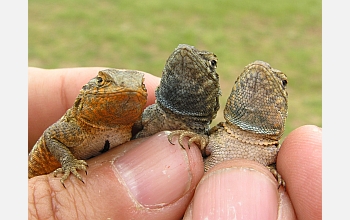News Release 06-079
Cooperation Keeps Lizards' Blue Genes from Fading
Breakthrough study shows genetics underlie altruistic behavior in some lizards

Scientists found that genetics underpins self-sacrificing behavior in some side-blotched lizards.
May 9, 2006
This material is available primarily for archival purposes. Telephone numbers or other contact information may be out of date; please see current contact information at media contacts.
Scientists have reported the first direct evidence that cooperative behavior in side-blotched male lizards arises from their genes. The findings, published in the May 9 Proceedings of the National Academy of Sciences by University of California--Santa Cruz's Barry Sinervo and colleagues, represent some 20 years of research into the altruistic or "self-sacrificing" behavior.
Side-blotched lizards, it turns out, come in three different throat colors--blue, orange or yellow. Sinervo had previously demonstrated the three throat colors in the males correlate with strikingly different behaviors.
The blues form partnerships, while the oranges are aggressors and the yellows are sneaky.
Say a pair of blue-throated males, for example, is protecting its territory from roaming orange-throated bullies. In a true act of selflessness, one blue throat steps forward to battle an intruding orange aggressor--thereby sacrificing his own chances to successfully mate.
Meanwhile, as blue throats and orange throats battle it out, yellow throats quietly sneak into unprotected territories to find females.
In nature, altruism seems contradictory to an animal's goals of survival and passing on its genes, so researchers have been trying to understand why one of the blue males in a partnership will put himself in harm's way to allow the other to reproduce. Even though it may forfeit their own reproductive chances, the fighting blue throats secure the persistence of their genes in future generations by enabling their blue buddies to avoid the aggressors and go on to mate.
By studying the genomes of male lizards of each throat color, Sinervo provided direct evidence that besides throat color at least three other genetic factors underpin the self-sacrificing behavior.
Mark Courtney, whose program in the National Science Foundation's biology directorate supports Sinervo's research said, "On the surface, cooperation in the absence of close-relatedness can seem to be evolutionarily counterproductive--but Sinervo explored the genes that underlie cooperative behavior and discovered how they can affect the genetic composition of future generations."
Courtney attributes Sinvervo's long-term commitment to research in this area as key to teasing out the complexities of the system.
For more on this story see the UC Santa Cruz and Michigan State University news releases.
-NSF-
Media Contacts
Richard (Randy) Vines, NSF, (703) 292-7963, email: rvines@nsf.gov
Tim Stephens, University of California, Santa Cruz, (831) 459-2495, email: stephens@ucsc.edu
Sue Nichols, Michigan State University, (517) 353-8942, email: nichols@msu.edu
Program Contacts
Mark W. Courtney, NSF, (703) 292-8481, email: mcourtne@nsf.gov
Principal Investigators
Barry Sinervo, University of California, Santa Cruz, (831) 459-4022, email: sinervo@biology.ucsc.edu
The U.S. National Science Foundation propels the nation forward by advancing fundamental research in all fields of science and engineering. NSF supports research and people by providing facilities, instruments and funding to support their ingenuity and sustain the U.S. as a global leader in research and innovation. With a fiscal year 2023 budget of $9.5 billion, NSF funds reach all 50 states through grants to nearly 2,000 colleges, universities and institutions. Each year, NSF receives more than 40,000 competitive proposals and makes about 11,000 new awards. Those awards include support for cooperative research with industry, Arctic and Antarctic research and operations, and U.S. participation in international scientific efforts.
Connect with us online
NSF website: nsf.gov
NSF News: nsf.gov/news
For News Media: nsf.gov/news/newsroom
Statistics: nsf.gov/statistics/
Awards database: nsf.gov/awardsearch/
Follow us on social
Twitter: twitter.com/NSF
Facebook: facebook.com/US.NSF
Instagram: instagram.com/nsfgov


